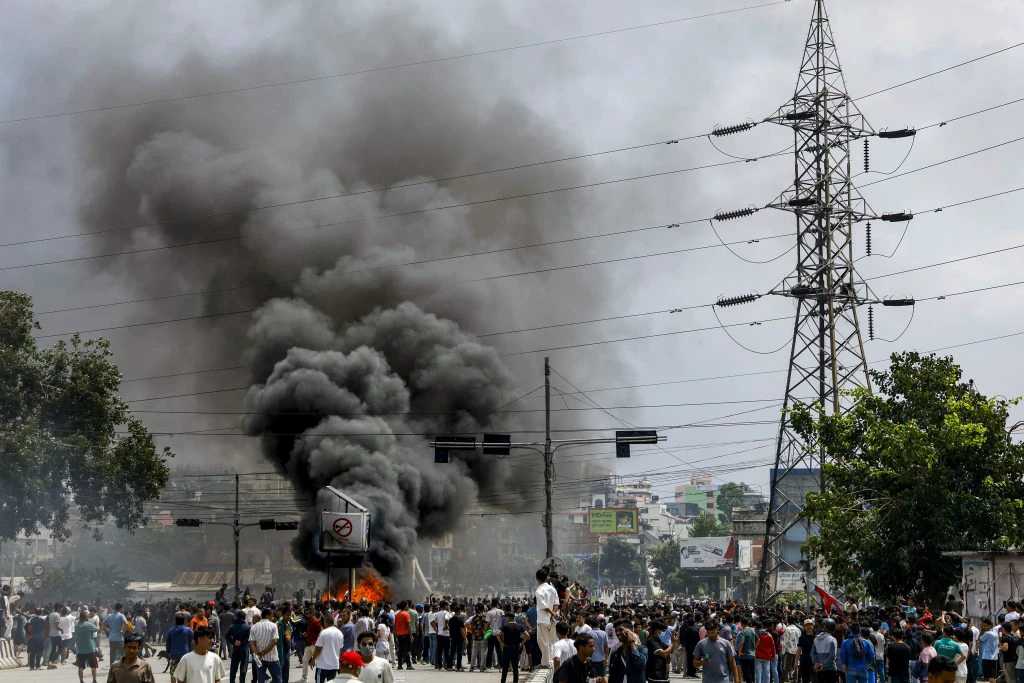New Delhi: Nepal has been placed under prohibitory orders and nationwide curfew after two days of youth-led protests spiralled into the country’s worst political upheaval in decades, leaving 19 people dead and forcing Prime Minister K.P. Sharma Oli to resign.
The Nepali Army
(September 10) that prohibitory orders would remain in force until 5 pm, after which a curfew would take effect nationwide from 6 am Thursday. The restrictions would remain until further notice, depending on the evolving situation.
The Army also appealed to protesters who may have looted or come into possession of weapons, ammunition or other equipment during the unrest
to the nearest security agency. Citizens were further urged not to wear security force uniforms without authorisation.
The Army expressed sorrow over the loss of life and property during the demonstrations, but warned that “anarchic elements” had infiltrated the protests, engaging in arson, looting, vandalism, violent assaults and attempted sexual violence.
“Any such criminal acts carried out under the name of protest will be treated as punishable offences, and strong action will be taken by security forces,” it said.
Essential services will be exempt from the curfew. Ambulances, hearses, fire brigades and vehicles used by health workers and security personnel will be permitted to operate, but citizens needing urgent assistance have been asked to coordinate with nearby security forces.
The Army also appealed to the public to rely only on official notices and not to fall for misinformation, while stressing its commitment to “national unity, social harmony, security and humanitarian values.”
According to Reuters, soldiers were guarding Nepal’s parliament on Wednesday, where the main hall was gutted by fire after being set ablaze during Tuesday’s unrest. Several other government buildings, including the Supreme Court, ministers’ homes and Oli’s private residence, were also torched. Burnt vehicles and twisted heaps of metal littered the capital, while army firefighters worked to contain blazes.
Flights were disrupted, with Kathmandu’s airport shut until the evening.
, the Army requested foreign nationals in Nepal to contact the nearest security office or deployed personnel if they require urgent assistance such as evacuation or facilitation. It also asked hotels, tourism operators and other institutions connected with foreign citizens to help coordinate support where necessary.
As per media reports, talks were being prepared between authorities and protest representatives to defuse the crisis, though details were unclear. Former Supreme Court judge Balaram K.C. urged protesters to form a negotiation team and called for parliament to be dissolved and fresh elections held.
India’s Cabinet Committee on Security also met late Tuesday to discuss the turmoil in its neighbour. Prime Minister Narendra Modi “Nepal’s stability, peace and prosperity are of utmost importance. I humbly appeal to all my brothers and sisters in Nepal to maintain peace and order”.
The unrest began with protests against a government-imposed ban on social media platforms such as Facebook and X, quickly spreading into broader demands for transparency and an end to corruption. Organised largely by Generation Z activists, the movement drew young Nepalis who faced limited economic opportunities and rising political discontent.
On Monday, September 8, police fired tear gas and rubber bullets to disperse protesters near the parliament, resulting in at least 19 deaths and numerous injuries.
the next day, stating in his letter that he was stepping down to facilitate a constitutional political solution. He remains in office in a caretaker capacity.
But his resignation was not even to quell the violence. Protesters set fire to government buildings, including parts of Singha Durbar, the Prime Minister’s office, the Supreme Court, and the President’s residence, as well as the houses of political leaders. There were also videos circulated on social media showing protesters beating up Nepali Congress leader and four time prime minister Sher Bahadur Deuba and his wife, Arzu Rana Deuba, the foreign minister.
It led to the Nepal army announcing on Tuesday evening that it would deploy personnel to control the situation.
